Text Solution
Verified by Experts
Topper's Solved these Questions
GAUSS'S THEOREM
BETTER CHOICE PUBLICATION|Exercise LONG ANSWER TYPE QUESTIONS|9 VideosGAUSS'S THEOREM
BETTER CHOICE PUBLICATION|Exercise MOST EXPECTED NUMERICALS|4 VideosGAUSS'S THEOREM
BETTER CHOICE PUBLICATION|Exercise MOST EXPECTED QUESTIONS |10 VideosFORCE ON A CURRENT
BETTER CHOICE PUBLICATION|Exercise NUMERICAL PROBLEMS|10 VideosHUYGENS' PRINCIPLE
BETTER CHOICE PUBLICATION|Exercise LONG ANSWER TYPE QUESTIONS |11 Videos
Similar Questions
Explore conceptually related problems
BETTER CHOICE PUBLICATION-GAUSS'S THEOREM-SHORT ANSWER TYPE QUESTIONS
- What is the use of Gaussian surface in electrostatics ?
Text Solution
|
- What is the importance of Gauss’theorem in electrostatics ?
Text Solution
|
- State and prove Gauss's theorem in electrostatics.
Text Solution
|
- Using Gauss’s law, determine the electric field intensity due to a lon...
Text Solution
|
- State Gauss' law in electrostatics. Using this law, derive an expressi...
Text Solution
|
- State Gauss' theorem in electrostatics. Derive an expression for the e...
Text Solution
|
- State Gauss’s theorem.How Coulomb’s law can be derived from it ?
Text Solution
|
- What is electriG flux ? Explain how the electric flux through a surfac...
Text Solution
|
